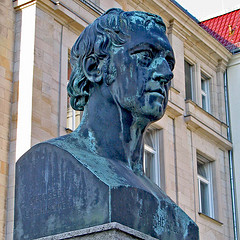Jun 9, 2010
The Web of Intentions
 John Battelle recently pointed out that Google is compiling a Database of Intention (strictly speaking, he pointed this out back in 2003).
John Battelle recently pointed out that Google is compiling a Database of Intention (strictly speaking, he pointed this out back in 2003).
Said database is comprised of every search ever entered, every list of results every tendered, and every click-path thereafter taken. Referring to AdWords, AdSense, and Omniture, he additionally pointed out that an ecosystem had blossomed around this pure, though recently attenuated, signal.
One implication/assumption of his insight: Wherever we feel that humans are expressing intent, business(es) will grow.
To put it another way: When I know what you want to do, I can make money by facilitating the accomplishment of that need.
Although there were some who disagreed with Battelle, the many comments on the post demonstrated the concept’s potential primarily by playing with it. For example, some said the Web also constitutes a database of “What I’m listening to” or “What I’m eating” or “What I just saw.” Furthermore, someone also pointed out that all the commercial information on the web – “What I actually bought” – significantly completes the intention picture by capturing which intentions actually led to thing businesses care about most: realized revenue.
This all took me back to 1995 when I was teaching Hegel to Middelbury students and told them that the world wide web was the true realization of Hegel’s “Phenomenology of Mind” because, in the totality of the web, Spirit (“Geist” or “Mind”) represented itself to itself in an unprecedented manner. (In his characteristically grandiose fashion, Hegel had implied that this self-representation was happening in his book.)
The web is the medium of our lives and increasingly a medium where fusion overcomes immersion. As such, the Web doesn’t just archive what we’re looking for; it archives much of what we actually do. Not just, “This is what I said,” but, “This is what I’m saying.” Not just, “This is what I saw,” but, “This is what I’m seeing.” Not just, “This is what I thought,” but, “This is what I’m thinking.” Etc.
Many years ago, I saw some German dudes talking about how private videotapes constituted the greatest recorded catalog of everyday life ever assembled. The web has absolutely superseded that by creating “not just” a database of intention (in addition to a database of videotaped qoutidiana), but a database of consciousness itself.
Any idears how we could make money off that? Wait, somebody already has!
Image Source: quapan.
I’ve always had a feeling that the web was an extension one’s thinking or wandering about mind, but in slow motion.
[…] This post was mentioned on Twitter by Ramundus Llullius and Dave Wieneke, Matthew T. Grant. Matthew T. Grant said: Self-promotion alert: Just posted something about John Battelle, the Database of Intentions, Google, Hegel, and MONEY http://bit.ly/binTur […]
[…] I wrote about the “database of intentions” and linked that concept to my own longstanding view of the web as the “database of human […]
I’m in Mr. Summers philosophy class and I think your blog/writing/insight is BRILLIANT!!!
I’m in Mr. Summers philosophy class reading this interesting article. Great Work!
That was a fantastic article Mr. Grant. I am currently in a Philosophy class of my own, taught by a Mr. Summers.
I was wondering, do you think that Hegel might actually disagree with your statement that the world wide web was the true realization of the “Phenomenology of Mind”, in terms of how it can actually be used as an isolating factor? Take online video games. Doesn’t this actually contradict Hegel’s idea of self-realization through recognition of another’s self-consciousness? If you are purely focused on your own interests and ideas, manifested through the web, then you are only halfway to this realization of self-consciousness.
Thanks for leaving a comment, Helen.
I’d be curious to know which of my insights you found particularly illuminating.
Thanks for reading, Arnold!
Thanks for reading and taking the time to leave a comment, Jordan.
Although I’m sure that Hegel would disagree with almost everything I say , I’m not sure he would disagree in this case. While you are correct that, on the individual level, immersion in video games or the online world more generally can be very isolating and in fact prevent or stunt the self-realization you describe, I was thinking of the Web as an entirety. Hegel wrote, “The Whole is the True,” which I take to mean that we only realize the truth when we have understood the total context of everything. Of course, since no individual can comprehend the entirety of reality, we are always moving towards the truth stepwise (or dialectically) while never reaching the final truth (as individuals).
If, however, we think of consciousness at a universal level, that is, as something containing all individual moments of consciousness, this notion of total understanding, or “absolute knowledge,” as Hegel called, becomes conceivable. When I talk about the Web as realizing some element of Hegel’s “Phenomenology,” I’m referring to this universal level of consciousness.
In order to know itself at this meta-level, Spirit needs a concrete representation/reflection of itself. What I’m suggesting is that the Web, as something that potentially includes the totality of human thought, desire, and intention, could serve as this objectification of Spirit to itself.
Does that make sense?
[…] there’s this thing called the Internet where I can tell my story to the whole wide world. Who knows? Maybe Greil Marcus and Tom Ashbrook […]
Yes Mr. Grant, that clears it up quite nicely, thank you! 🙂